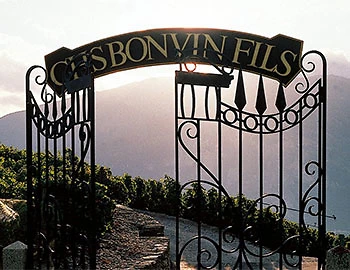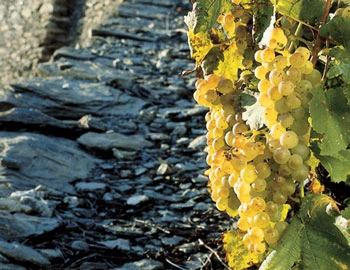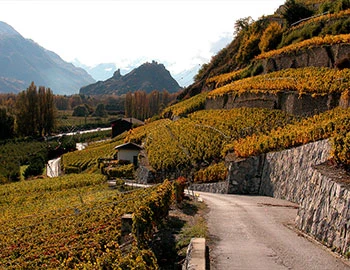Fendant Brûlefer Tradition 2023
AOC Wallis, Bonvin, 750 ml

| Grape variety: | Chasselas |
| Producer: | Bonvin |
| Origin: | Switzerland / Wallis |
Description
An extraordinairy Fendant, which will convince most sceptics. Its pronounced floweriness with hints of acacia flowers and delicate jasmine in the nose is an exciting contrast to the taste, which features delicate almond and stone fruit notes, supported by a fresh tingling and salty tartness.
Attributes
| Origin: | Switzerland / Wallis |
| Grape variety: | Chasselas |
| Label: | Vegan |
| Ripening potential: | 1 to 3 years |
| Drinking temperature: | 10 to 12 °C |
| Food Pairing: | Apéro pastries, Cheese board, Fresh water fish with cream sauce, Fondue and raclette |
| Vinification: | pressed carefully and immediately, fermentation in steel tank, fermentation at low temperatures |
| Harvest: | hand-picking, strict selection |
| Maturation: | in steel tank |
| Volume: | 12.5 % |
| Note: | Contains sulphites |
Bonvin
High above Sion, on the Clos du Château, is the heart of the oldest wine trading house in Valais – today's winery Charles Bonvin SA. The view sweeps over the wide Rhone valley, meets the two castle hills of Tourbillon and Valère and grazes on the magnificent Valais vine landscape with its countless terraces.
In the mid-19th century, Valais was a poor area. The valley was largely marshland. The people, mostly farmers, mainly subsisted from agriculture and the dairy industry. The wineries were set up where nothing else could be grown. The vineyard was smaller than the one in Zurich and the yield was mostly for self-consumption. The Valais wine couldn't leave its borders, although it had been cultivated since Roman times.

Bonvin
High above Sion, on the Clos du Château, is the heart of the oldest wine trading house in Valais – today's winery Charles Bonvin SA. The view sweeps over the wide Rhone valley, meets the two castle hills of Tourbillon and Valère and grazes on the magnificent Valais vine landscape with its countless terraces.
In the mid-19th century, Valais was a poor area. The valley was largely marshland. The people, mostly farmers, mainly subsisted from agriculture and the dairy industry. The wineries were set up where nothing else could be grown. The vineyard was smaller than the one in Zurich and the yield was mostly for self-consumption. The Valais wine couldn't leave its borders, although it had been cultivated since Roman times.

Chasselas
Swiss pride
From cheerful drinking wine to the classy grand cru: the Chasselas is, with good reason, the flagship of Switzerland. It is extremely multifaceted. A young, apple and pear fruit specimen turns raclette into a feast. And a mature plant from the steep slopes of Lake Geneva, for instance from Lavaux, perfectly accompanies fish and seafood with its nut and flint notes. In its stronghold, the canton of Vaud, the Chasselas was once called Fendant. It has been known there for over 500 years. But at the beginning of the 20th century, vintners renamed it Chasselas, and from then on wrote the communities of origin on the label. Meanwhile, the grapes gathered such a reputation in neighbouring Valais as Fendant that most people today believe the name was invented there. The difference between the regions is that in Vaud the terroir expression of Chasselas is particularly noticeable. In Valais, conversely, the warm weather allows particularly round, fruity wines to develop. The Chasselas from Neuchâtel is not to be forgotten. A specialty there is the non-filtré, an unfiltered wine which is enjoyed in January as an early harbinger of spring.

Switzerland
Switzerland – A small country with enormous diversity
Switzerland is famous for its banks, watches, and cheese, but not necessarily for its wine. The Swiss didn't invent wine, but they have been extremely open and curious to it. Wine culture arrived in what is now modern Switzerland via several routes: from Marseilles to Lake Geneva and the Lower Valais region; from the Aosta Valley through the Great St. Bernard Pass to the rest of Valais; from the Rhone through Burgundy, across the Jura Mountains to Lake Constance; and from Lombardy to Ticino, and then on to Grisons.



